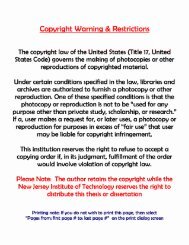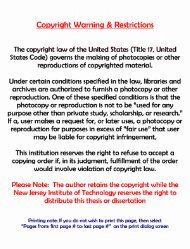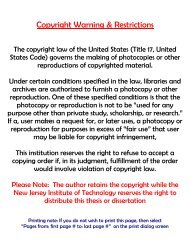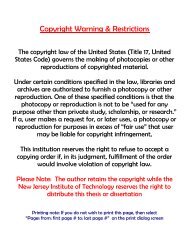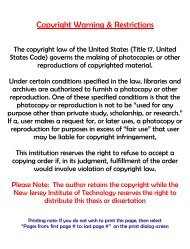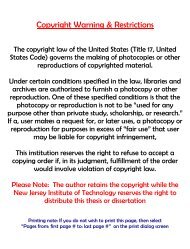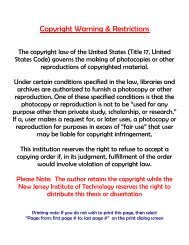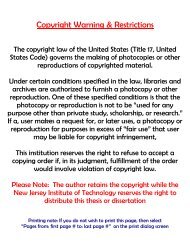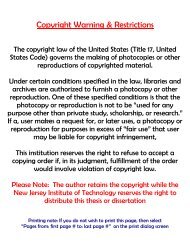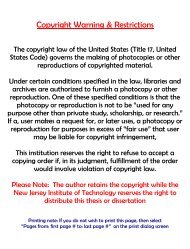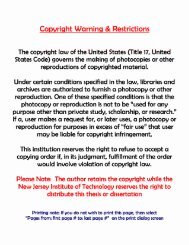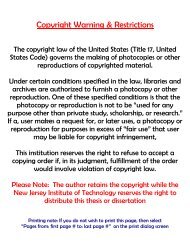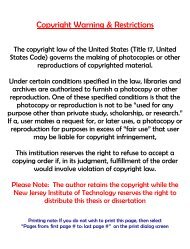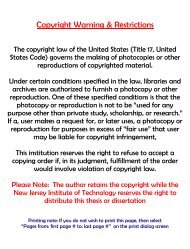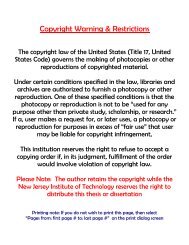- Page 1 and 2:
Copyright Warning & Restrictions Th
- Page 3 and 4:
PREDICTION OF BATCH HEAT TRANSFER C
- Page 5 and 6: while the latter has five to seven
- Page 7 and 8: ACKNOWLEDGEMENTS The auther ex~ress
- Page 9 and 10: Chapter 1: Chapter 2: Introducticm
- Page 11 and 12: LIST OF FIGURES page 2-1 FlGW Behav
- Page 13 and 14: CHAPTER I INTRODUCTION BATCH HEAT T
- Page 15 and 16: 3 as pseudoplasticso Pseudoplastic
- Page 17 and 18: 5 ~n addition to studying the effec
- Page 19 and 20: 7 A B SLOPE = /'n- .( 10 ~y FIG 2-1
- Page 21 and 22: 15.5, 183, 185).. Most of their eff
- Page 23 and 24: va:ry withl. the slaear I'Rte.. 11.
- Page 25 and 26: 13 RHEOLOGIC_~ INVESTIGATION OFPO~~
- Page 27 and 28: IS In(s) (2-8 (2-9 where Re is the
- Page 29 and 30: '7 ft~ easier method of calibrating
- Page 31 and 32: 19 of' thixotropic breakdown l'Ji t
- Page 33 and 34: 21 complicated by a variable viscos
- Page 35 and 36: 2J Schultz-GrQnow (174) used a dime
- Page 37 and 38: 2S The results shm-red that equatio
- Page 39 and 40: Su.bstituti011 of equati 2-22 gives
- Page 41 and 42: 29 In both Newtonian and non-Newton
- Page 43 and 44: 31 for viscous pseudoplas tics at 1
- Page 45 and 46: 33 (2-29 when both the distances ar
- Page 47 and 48: JS Thermometers or thermocouples ar
- Page 49 and 50: .37 2: a in in heat cQ@tent of the
- Page 51 and 52: J9 cooling mediu..:m side, the heat
- Page 53 and 54: 41 ports a value of 3/4-.. He then
- Page 55: 43 find the effects of one or two o
- Page 59 and 60: 47 the highest heat tra...nsfer coe
- Page 61 and 62: 49 A pitched blade turbine gave coe
- Page 63 and 64: SI done on the correlation of heat
- Page 65 and 66: 5J evaluated at the wall temperatur
- Page 67 and 68: ss to (2-46 where ill is the consis
- Page 69 and 70: CHAPTER .2 DEVELOPMENT OF CORRELATI
- Page 71 and 72: momentum" mass" and energy may be ~
- Page 73 and 74: 61 Vr;> Jt.- ,,"Ii'\... ..", ::: (V
- Page 75 and 76: 63 Substitution of these dimensionl
- Page 77 and 78: l/(R + 1) and was able t@ elim.iE.a
- Page 79 and 80: 67 All of the variables and differe
- Page 81 and 82: 69 The average heat transfer coeffi
- Page 83 and 84: N"v = C Iv''' (;';~-"')&'i'~ (%t-n,
- Page 85 and 86: 73 Semi-Empirical Correlation i ..,
- Page 87 and 88: 75 7I1C1?/lfOCOUPLc .JuNe T/ON IMBE
- Page 89 and 90: 77 _I"---- / SCALE I ~~, .5 j t /Z.
- Page 91 and 92: also cop~ected to the pipes leading
- Page 93 and 94: 81 Ve8sel :J all th:l c]me 8 8 .) '
- Page 95 and 96: 83 potentiometer for varing the mot
- Page 97 and 98: 85 MATERIAL 7:0 STAIIJLESS STEEL /
- Page 99 and 100: 11 Wa.ll (Mi€1dl~) Same as #5 81
- Page 101 and 102: 89 shea.r ra.tes, tl?1ey a.re unaff
- Page 103: and if' lO"V'l$' a sm.all amount of
- Page 106 and 107:
94- was about 40-45 ndmutes .. Tke
- Page 108 and 109:
96 vThere N is in rev./sec .. and S
- Page 110 and 111:
88 ql\fETI A = 6 T \--T -s L/kw (1+
- Page 112 and 113:
I {)D The generalized Reynolds n~mb
- Page 114 and 115:
02. CHAPTER !2. RESUI,TS Many heat
- Page 116 and 117:
01 TABLE 5-2 sutn~U{Y OF ADDITIONAL
- Page 118 and 119:
108 the batch than the other ticJO
- Page 120 and 121:
108 optimum impeller heights were u
- Page 122 and 123:
10 I r "'" , •• ,'., "",' """",
- Page 124 and 125:
112 correlations for the prediction
- Page 126 and 127:
TABLE 5 - 4 Correlation Constants A
- Page 128 and 129:
1/6 Table 5-5 and 5-6. A measure of
- Page 130 and 131:
TABLE S - 6 IMPELLER Correlation Co
- Page 132 and 133:
120 greater than 2.0. In this case
- Page 134 and 135:
12.2
- Page 136 and 137:
TABLE 5 - 9 CORRELATION E t (a/n +1
- Page 138 and 139:
TABLE 5 - 10 IMPELLER Correlation C
- Page 140 and 141:
TABLE 5 - 11 CORRELATION G (1.30/61
- Page 142 and 143:
1.30 of the substantial improvement
- Page 144 and 145:
1.3 2. The probable error in the ca
- Page 146 and 147:
134 .,;' : :: :::: : ~ !~. , " . .'
- Page 148 and 149:
T." ••••••• ,_ .....
- Page 150 and 151:
38 the cooling of nitration liquors
- Page 152 and 153:
140 The average deviation of the me
- Page 154 and 155:
42 tween 0.25 and 0.58. L~~l had re
- Page 156 and 157:
144 transfer coefficients to non-Ne
- Page 158 and 159:
16 of fit and it may t...herefore b
- Page 160 and 161:
148 'tvas insufficient data to eval
- Page 162 and 163:
50 A ::: Apr ... B ::: C p ::: CPr
- Page 164 and 165:
52. Q ::. Average heat transfer rat
- Page 166 and 167:
Xc = Function of Reynolds nL:l.m.be
- Page 168 and 169:
IS6 G REE:>{ ALPHABET 0 ::: Value o
- Page 170 and 171:
158 coefficient. Thus, for the wate
- Page 172 and 173:
160 , ., I .. : I :. '. • • !.
- Page 174 and 175:
162 I , . I . "I '1 I i I 1 I 1· '
- Page 176 and 177:
64 ncr --~iIluto e torque of the in
- Page 178 and 179:
166 rive different temperatures; ab
- Page 180 and 181:
168 TABLE A-4. SLOPE OF "LOG SHEAR
- Page 182 and 183:
TABLE 11.-5 RHEOLOGICAL DATA FOR CA
- Page 184 and 185:
TABLE A-5 (eollt. ) /12 o . 24;;& C
- Page 186 and 187:
'11 The flow behavior index and flu
- Page 188 and 189:
i .f.C ·F s o 6 1 6 I
- Page 190 and 191:
· . . . " , · . :::11" ': "'" ~ .
- Page 192 and 193:
180 Tke thermal e€l1'!ciluetlvity
- Page 194 and 195:
182 Heat capacity data for 100% gly
- Page 196 and 197:
IB4- wkiek ex~resses the aensity e
- Page 198 and 199:
186 Ts - Torque X :: Peree~t 0~ ful
- Page 200 and 201:
Phase I Calcu13tiJ~ of Slope of !oG
- Page 202 and 203:
3 REAL). N. ti •• D 4 cN=N E'I'
- Page 204 and 205:
~~-- ~---- --~--~ ~~~--------------
- Page 206 and 207:
Phase IV Correlation of Flow Behavi
- Page 208 and 209:
96 HEAT TRANSFER DATA FOR WA'fER US
- Page 210 and 211:
DATA /98 Batch \'ieight '" 94 •.
- Page 212 and 213:
zoo Run Center Dia!!1ec;er Ri'M Are
- Page 214 and 215:
DATA 20l. WATER - TUHBINSS Batch We
- Page 216 and 217:
204- HEAT T'rtANSFEH DATA USED IN C
- Page 218 and 219:
DATA ANCHor;: 206 Batch :'Ieight =
- Page 220 and 221:
2.08 Run Diameter RP!'1 Area Dynamo
- Page 222 and 223:
DAT_': 210 "i'ADDI,ES 9:5.7'10 GLYC
- Page 224 and 225:
212 DATA PADDLES 0.15 PEHC:::N'r CA
- Page 226 and 227:
211- D!~ 'I'l\. PA-:JDLES 0.20 PERC
- Page 228 and 229:
~;:. 'I'A 3.16 P.;'DDLES 0.24 PEHCE
- Page 230 and 231:
2/8 DATA PROPELL:SH3 0.15 P:~RCEN'l
- Page 232 and 233:
DATA DISK & VANE 'l'URBINE \'iATER
- Page 234 and 235:
2.22 DATA Tu.'i:SINES 0.15 PERCENT
- Page 236 and 237:
CALCULATION OF HEAT TRANSFER AND PR
- Page 238 and 239:
________________ ~parent viscosity
- Page 240 and 241:
------------------------ -_._------
- Page 242 and 243:
~--~, ~ ---- ---- -----------~-----
- Page 244 and 245:
232 NOMEliCLATURE FOR BEAT TRANSFER
- Page 246 and 247:
2.34- CALCULATED RSSULTS WATER Run
- Page 248 and 249:
2,36 Run Center Diameter h NNu Npo
- Page 250 and 251:
2.38 CALCULAT'ED ~E~:UL'rS ?!ATER P
- Page 252 and 253:
CALCULA'rED 1-{E8iiLlJ. 1 S \.;!\.'
- Page 254 and 255:
CALC:_:LA'i'ED _12:-)ULTS 24c. ANCH
- Page 256 and 257:
CALCULATEDR3SULTS PADDLE - CENTER H
- Page 258 and 259:
CALCULATED HESULTS 216 PADDLES - CE
- Page 260 and 261:
248 CALCULATED RESULTS PADDLES - CE
- Page 262 and 263:
CALCULATED RE:>ULTS 2. So PADDLf~S
- Page 264 and 265:
PADDLES - CALCULATED RE6ULTS CENTSH
- Page 267 and 268:
255 CALCULATED !tESULTS PROPELLERS
- Page 269 and 270:
CALCULA'rED RELmL'l'S PROPELLr~RS -
- Page 271 and 272:
CALCULATED HESULTS DISK AND VANE ;r
- Page 273 and 274:
DISK AND VAI'E .rU~1BINES CALCULATE
- Page 275 and 276:
DISK AND VANE '.i.'UR13HiES - CEl'i
- Page 277 and 278:
26S RESULT,:; U:3ED FOR REGRESSION
- Page 279 and 280:
of a least squares line can be calc
- Page 281 and 282:
269 (0-9 where y "" log NNu xl = lo
- Page 283 and 284:
-------------- -.Basi.c "Progr.a.rr
- Page 285 and 286:
-----------~---------- -~----------
- Page 287 and 288:
--~-------------- ------ ~~ -------
- Page 289 and 290:
Modi fi cati onB-foT' ev:alnatj ng-
- Page 291 and 292:
constants forco~~~latjQn F --------
- Page 293 and 294:
.------~.~~-- ---------------------
- Page 295 and 296:
28.J ENGLISH ALPHABET . - ¢,'"'~-=
- Page 297 and 298:
References 2.8S 1. ') L. 3. Lt- •
- Page 299 and 300:
287 56. 57. 58. C:;o ./ / . 60. 61.
- Page 301 and 302:
289 119. 120. 121. 122. 123. 12L~
- Page 303 and 304:
176. 177. 178. 179. 1(30. 181. 182.



